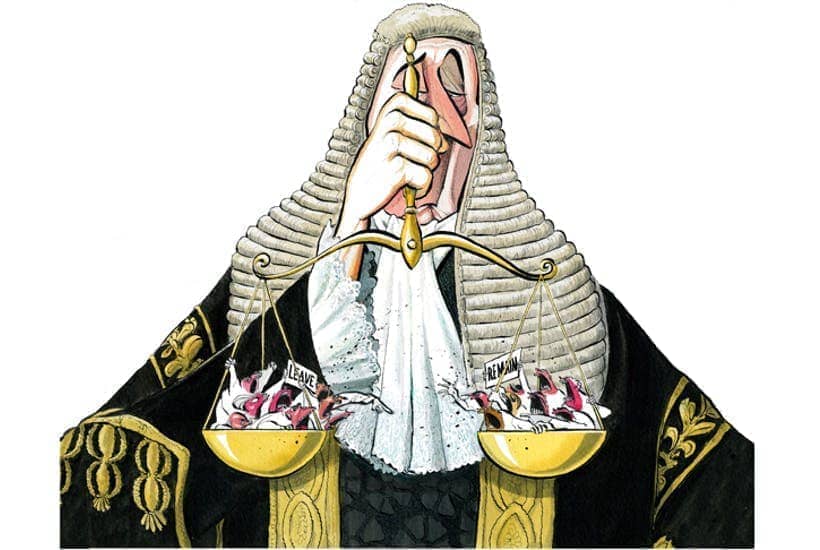The British commentariat has not covered itself in glory in its reaction to Dominic Raab’s proposed reforms to judicial review. The Times reported yesterday that the government is planning to introduce a novel legislative tactic, the ‘Interpretation Bill’, to try to shift the balance of power back towards parliament. To be clear: there is no prospect of ministers being given the power to strike down court judgments they dislike.
In fact, the core of the proposal is perfectly orthodox. The proper way for parliament to change the law is through legislation, and an Interpretation Bill is legislation. It would need to be passed in the normal way, and MPs would have to vote it through. No despotism involved.
The barrister and commentator Matthew Scott has suggested on Coffee House that parliament would be unable to improve on the carefully considered judgements of the courts in the limited amount of time that an annual bill would allow.
When judges’ interpretations deviate from that of politicians, parliament has every right to update the law to make its intentions clear
There is some merit to the idea that an annual bill would be impractical, but it is not an insurmountable hurdle. Yes, an annual bill would place more strain on an already-crowded legislative timetable and there could well be a case for reducing the frequency of the legislation.
However, an omnibus bill tackling multiple cases at once remains less time-consuming either than bringing forward ad hoc legislation in response to individual cases or trying to do a wholesale overhaul of any legislation affected by adverse judgments. If you believe in what the Interpretation Bill is trying to achieve — returning to parliament ultimate sovereignty — it seems the least-worst means of doing it.
This approach also has the advantage of focusing parliament’s intervention directly on the point of controversy, which would make it more difficult for judges to interpret their way around the point in future. Take for example Evans, the famous ‘black spider letters’ case about Prince Charles’s missives to ministers. The Freedom of Information Act gave the Attorney General a discretionary veto; the Supreme Court, in Evans, basically interpreted it out of existence. It is one of the most egregious examples of interpretive overreach highlighted by sceptics of judicial power.
It isn’t obvious that a general overhaul of the FoI Act would prevent future judges doing the same again. A targeted intervention on the point of contention, which basically saw parliament legislate specifically to the effect that Evans was wrongly decided, is quite another matter. It is precisely such interventions that the government intends to make in an Interpretation Bill.
What about the Prime Minister’s desire to overturn Miller II, which saw the Supreme Court annul his prorogation of parliament?
This would not, in principle, be difficult to do: parliament could simply legislate that the lower court’s finding in the same case, which the Supreme Court overturned, was the correct interpretation of the law. Those trying to pretend the Supreme Court made the obvious decision skate over the fact that the High Court judgment was a crystal clear and, at the time, entirely unremarkable statement of constitutional orthodoxy which surprised nobody.
The general sense from the government’s critics is more that they simply do not want particular judgments overturned. Gina Miller herself, for example, has said of the plans that the government is ‘transforming our proud constitutional democracy into an autocracy, and seeking revenge on those who hold it to account’. We have already tackled the ‘autocracy’ claim; the Prime Minister’s motivations are neither here nor there. The merits of an Interpretation Bill as a legislative tactic are separate to whether or not you or I consider the government’s specific ends to be wise.
Judges play an important role in our system of governance. They take general legislation and, by applying it in individual cases, give it granular detail. Nobody denies the importance of this. However, it is an unsustainable leap to claim that the role of judges (and lawyers) in deciding what the law is gives them or should give them some privileged role in deciding what the law ought to be.
Clearly judges are able to rule in a way that is contrary to the intentions that parliament had when it passed a law — particularly when a case is technical and specific. But when judges’ interpretations deviate from that of politicians, parliament has every right to update the law to make its intentions clear, and its executive arm, the government, to draft and table legislation to that effect. The principles of parliamentary sovereignty, the constitution, and the supremacy of the democratic arm of the state demand nothing less.
Those who disagree with this principle, for understandable reasons, can’t just up and say so. So they try to bury the issue in talk of practicality and process. The question of ‘better law’ is a red herring; the heart of this struggle is about ends, not means. If the government’s opponents are really just concerned about the practicalities, ministers should challenge them to suggest a better way for a more active parliament to bring the law into line with its will. I suspect they will be waiting a long time for an answer.






Comments